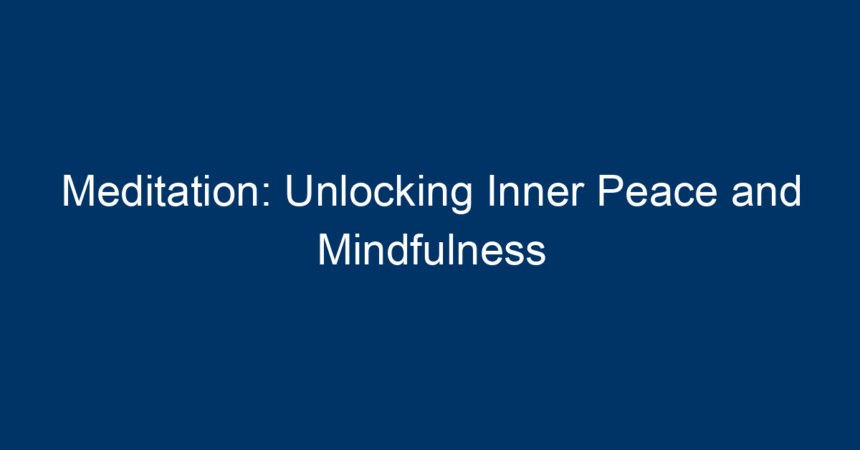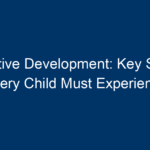In our fast-paced world, the pursuit of inner peace and mindfulness often feels like an elusive dream. Stress, anxiety, and distractions can cloud our minds and disrupt our sense of wellbeing. However, one ancient practice has stood the test of time in offering a refuge from chaos: meditation. This transformative technique not only fosters a profound sense of calm but serves as a holistic approach to connecting with ourselves and the present moment. In this comprehensive guide, we’ll explore the essence of meditation, its myriad benefits, practical techniques to get you started, and actionable insights to help you incorporate it into your daily routine.
What is Meditation?
Meditation is a practice that involves training the mind to achieve a state of focused attention or heightened awareness. It can take various forms, ranging from simple breathing exercises to complex visualization techniques. At its core, meditation aims to cultivate mindfulness—the practice of being fully present in the moment, observing thoughts and feelings without judgment.
The Rich History of Meditation
Meditation dates back thousands of years, with roots in ancient spiritual traditions, particularly in Eastern philosophies. Practices such as Buddhism and Hinduism have long emphasized the importance of meditation for spiritual growth, mental clarity, and emotional stability. Over time, these practices have permeated Western cultures, becoming more accessible to a broad audience seeking mental and emotional wellness.
The Benefits of Meditation
The benefits of meditation are vast and varied, impacting not just the mind but the body and spirit as well. Here are some key advantages:
1. Reduces Stress and Anxiety
One of the most well-researched benefits of meditation is its ability to reduce stress levels. Engaging in regular meditation activates the body’s relaxation response, which can significantly lower cortisol, the stress hormone. By promoting a state of calmness, meditation helps individuals manage anxiety and cultivate resilience against life’s challenges.
2. Enhances Emotional Health
Meditation encourages self-awareness, allowing practitioners to examine their thoughts and emotions without judgment. This practice fosters emotional intelligence, enabling individuals to process feelings more effectively and improve their overall well-being. Studies have shown that meditation can lead to lower rates of depression and higher levels of happiness.
3. Boosts Concentration and Focus
Regular meditation practice enhances cognitive functions, particularly attention and concentration. Techniques such as mindfulness meditation train the brain to focus on the present moment, reducing distractions and improving overall productivity.
4. Promotes a Healthy Lifestyle
Meditation can also inspire positive changes in behavior. Those who meditate regularly often report better sleep patterns, healthier eating habits, and increased physical activity. This holistic approach to well-being creates a ripple effect, leading to enhanced physical and mental health.
5. Connects You with Your Inner Self
At its core, meditation is about going inward. This practice fosters a deeper connection with your thoughts, feelings, and beliefs, allowing for self-discovery and personal growth. By prioritizing this time for self-reflection, individuals can cultivate a sense of purpose and clarity in their lives.
Different Types of Meditation
There’s no one-size-fits-all when it comes to meditation. Here are some popular forms to explore:
1. Mindfulness Meditation
Mindfulness meditation focuses on the present moment, allowing thoughts and feelings to come and go without attachment. Practitioners typically engage in breathing exercises to anchor themselves in the now, observing sensations, emotions, and thoughts with curiosity.
2. Transcendental Meditation (TM)
Transcendental Meditation involves silently repeating a specific mantra to settle into a state of profound relaxation. This technique is designed to transcend ordinary thought patterns, providing a deeper sense of inner peace.
3. Guided Meditation
In guided meditation, practitioners follow audio or video instructions to visualize peaceful scenarios or engage in specific techniques. This approach is ideal for beginners, as it provides structure and support throughout the practice.
4. Loving-Kindness Meditation (Metta)
Loving-kindness meditation focuses on cultivating compassion and love towards oneself and others. Practitioners often repeat phrases wishing well to themselves and those around them, fostering a sense of connection and goodwill.
Getting Started with Meditation
Starting a meditation practice can feel overwhelming, especially for beginners. Here’s a step-by-step guide to help you embark on this journey:
Step 1: Set the Scene
Choose a quiet, comfortable space where you won’t be disturbed. Creating a calming atmosphere can enhance the experience. You might want to use cushions, candles, or calming music to help set the mood.
Step 2: Find Your Position
Sit or lie down in a comfortable position. Ensure your back is straight to promote alertness, yet relaxed enough to avoid tension. You can sit cross-legged on the floor, in a chair, or even lie flat.
Step 3: Focus on Your Breath
Close your eyes gently and take a few deep breaths. Inhale slowly through your nose, allowing your chest and stomach to rise, then exhale gently through your mouth. Let your breath flow naturally and focus your attention on the sensation of breathing.
Step 4: Observe Your Thoughts
As you meditate, thoughts will naturally arise. Instead of engaging with them, acknowledge their presence and then gently guide your focus back to your breath. This practice builds awareness and trains your mind to respond calmly to distractions.
Step 5: Start Small
If you’re new to meditation, start with just five minutes a day. Gradually increase the duration as you become more comfortable with the practice. Consistency is key, so try to meditate at the same time every day.
Overcoming Common Challenges
While meditation can be incredibly rewarding, beginners often face common challenges. Here are some strategies to overcome them:
1. Restlessness
It’s normal to feel restless or anxious when you first start meditating. Instead of fighting this feeling, acknowledge it and allow it to pass. Gradually, you’ll train your mind to settle.
2. Difficulty Focusing
If you find it hard to focus, try using guided meditations or apps that provide structure. Many resources are available to help you stay engaged and motivated.
3. Self-Criticism
It’s common to feel self-conscious or judgmental during meditation. Remember, meditation isn’t about achieving perfection. Be kind to yourself; every moment spent meditating is a step towards mindfulness.
Incorporating Meditation into Your Daily Routine
To reap the full benefits of meditation, it’s essential to weave it into your daily life. Here are some actionable insights:
1. Make It a Habit
Set a fixed time each day to meditate, whether it’s in the morning, during lunch, or before bedtime. Consistency will help reinforce the practice and make it a natural part of your schedule.
2. Use Technology
Take advantage of meditation apps that offer guided sessions, reminders, and community support. Popular apps like Headspace, Calm, and Insight Timer provide a wealth of resources for practitioners of all levels.
3. Combine It with Other Activities
You don’t have to meditate in silence for long periods. Try incorporating mindfulness into everyday activities like walking, eating, or even washing dishes. Focus on the sensations and experiences of the present moment.
4. Join a Group
Consider joining a local or online meditation group. Sharing your practice with others can enhance motivation, provide accountability, and create a sense of community.
Conclusion: Your Journey to Inner Peace
Meditation is a powerful tool for unlocking inner peace and cultivating mindfulness. As you embark on this journey, remember that there is no right or wrong way to meditate. Each practice is unique and deeply personal. Embrace the challenges, celebrate the victories, and allow yourself to grow within the practice.
Whether you’re seeking stress relief, emotional healing, or a deeper connection with yourself, meditation has the potential to transform your life. Start small, stay consistent, and watch as the layers of stress and distraction begin to peel away, revealing a calm and centered version of yourself. By incorporating meditation into your daily routine, you can create lasting change and find your path to a fulfilling, mindful existence.




